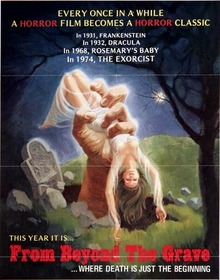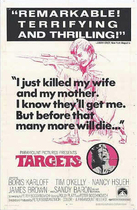Our editor-in-chief Nate Yapp is proud to have contributed to the new book Hidden Horror: A Celebration of 101 Underrated and Overlooked Fright Flicks, edited by Aaron Christensen. Another contributors include Anthony Timpone, B.J. Colangelo, Dave Alexander, Classic-Horror.com's own Robert C. Ring and John W. Bowen. Pick up a copy today from Amazon.com!
From Beyond the Grave (1973)
From Beyond the Grave is an Amicus horror anthology that is a surprisingly disturbing experience. It is the rookie outing of director Kevin Connor, who delivers a film that, while not flawless, is able to offer some solid chills. Boasting such genre veterans as David Warner, Donald Pleasence, and the legendary Peter Cushing, From Beyond the Grave is a superior anthology film that is in the best tradition of the subgenre.
The movie tells four stories of people who have, shall we say, unfortunate encounters with the spirits of the dead. In the first segment “The Gate Crasher,” Edward Charlton (David Warner) acquires an antique mirror that houses the spirit of an ancient killer. The second segment, "An Act of Kindness," follows Christopher Lowe (Ian Bannen), an unhappy husband who is offered an unusual way to make his life much better. In “The Elemental,” Reggie Warren (Ian Carmichael) finds himself plagued by a homicidal spirit that is bent on killing his wife. Finally, in “The Door,” William Seaton (Ian Ogilvy) purchases a sinister but beautiful door that leads to a hellish room. The common factor in all these stories is the mysterious antique shop owned by a kindly old man (Peter Cushing) who has the tendency to pass severe judgments upon those who wrong him.
The first of this film’s strengths is that it takes itself seriously. The stories could easily lend themselves to parody or black comedy, but Connor and his screenwriters never fall for that temptation. With the exception of “The Elemental,” which does have one broad, comic character, the stories in this film are presented as straightforward ghost stories. This presentation lends the film a foreboding quality that inculcates a sense of unease that pervades all of the stories. We never get the feeling that the cast or the filmmakers feel that they are above this kind of film, and this adds a sense of believability to the stories.
Like most anthology films, From Beyond the Grave provides O. Henry or Twilight Zone type stories with malevolent twists and harsh morals. All of the characters that come to bad endings have cheated Peter Cushing’s character out of money in some way. The only character that does not cheat him, William Seaton, survives his encounter with the supernatural. The punishments are a bit severe (forcing a person to commit multiple murders and then trapping them inside a mirror is indeed a harsh sentence for tricking someone out of money), but that is part of the fun of these films.
First-time director Kevin Connor’s work on From Beyond the Grave is superior, doing much more than simply following the characters. He often uses a hand-held camera, which presents a sense of urgency and, in many scenes, panic to the characters. Connor also utilizes odd lenses, particularly in the “An Act of Kindness” story, and extreme close-ups enhance a sense of dread in many of the stories. In a séance sequence, he aims the camera at a candle and then slowly pans across the faces of all the characters sitting around the table. The most inspired idea in the film, however, comes at the very end of the film. Peter Cushing has just foiled a robbery, and has shown that he is invincible to bullets. After tossing the would-be robber into a trunk and slamming the lid shut, Cushing addresses the audience directly, inviting us into his shop. It is both a chilling and amusing moment, and provides a very satisfying conclusion to the film.
The cast is, to a person, excellent. It is not surprising that Peter Cushing offers a subtle and nuanced performance as the narrator, a role in the vein of Ralph Richardson in Tales from the Crypt. In his scenes, Cushing does not go the slightest bit over the top; he underplays throughout, which makes him more chilling than if he had began chewing scenery. The great David Warner does very well with a character that has, at first, the condescending arrogance of a man who believes that he is in control of everything, but soon learns that his life is no longer his own. Donald Pleasence, portraying the street merchant Jim Underwood in "An Act of Kindness", is also a pleasure to watch. Pleasence sets a very ambiguous tone for Underwood. We never know if he is just offering a supportive ear to Christopher Lowe, or if he has some ulterior motive in mind. The strong and nuanced performances bolster the quality of the film, and help make it a very enjoyable experience.
While this is a quality horror anthology, it does contain some flaws. Not all of the director’s choices work. For example, the exorcism scene in “The Elemental” seems unsure of the tone it wants to set. Margaret Leighton plays the exorcist role of Madame Orloff for laughs, but Connor presents the rest of the scene in a straightforward manner. In addition, while the stories are engaging, there are times when they cannot overcome the “silliness” factor. This is due mainly to very unconvincing makeup and effects. The makeup worn by Marcel Steiner in “The Gate Crasher” is extremely weak, looking more like a Halloween costume than a malevolent ghost. A similar complaint exists for Jack Watson’s makeup in “The Door” segment. Additionally, David Gamley’s musical score is weak, punctuated with the occasional xylophone for unwanted comic effect. This type of score can puncture the sense of unease in this type of film, and it does so here.
Despite its few flaws, From Beyond the Grave is a charming film (if indeed a horror film can be charming) that does not insult its audience with unnecessary comic relief. The acting is top-drawer, the direction is solid, and the stories, if not astounding, are enjoyable vignettes of horror. This film is a welcome addition to the Amicus canon.








